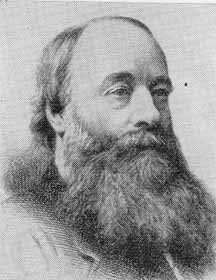
|
Joule, James (1818-1889) English physicist who was initially
interested in the efficiency of electric motors. He discovered the
heat dissipated by a resistor is given by Q = I2Rt (where I is the
current, R the resistance, and t the time ), a result now known as
Joule's law.
Motivated by theological beliefs, Joule began attempting to
demonstrate the unity of forces in nature. He determined the
mechanical equivalent of heat by measuring change in temperature
produced by the friction of a paddlewheel attached to a falling weight
in the 1840s. He made a series of measurements and found that, on
average, a weight of 772 pounds falling through a distance of one foot
would raise the temperature of one pound of water by 1° F. This
corresponds to (772 ft lbs)(1.356 J/ft lb) = 59 453.6 Calories, or 1
cal = 4.15 Joules, in close agreement with the current accepted value
of 1 cal = 4.184 J. Joule was not the first person to establish the
mechanical equivalence of heat, but it was his demonstration that
eventually came to be accepted. He did not claim, however, to have
formulated a general Law of Conservation of Energy. Nevertheless, his
experiments were certainly fundamental in bringing that formulation
about. In addition, Joule's experiments showed that heat is produced
by motion, contradicting the caloric theory.
|

